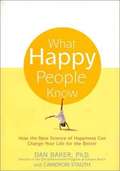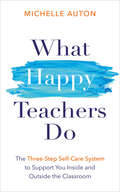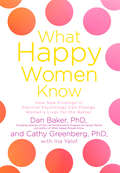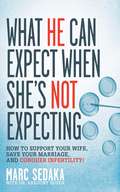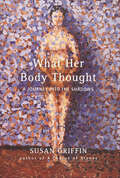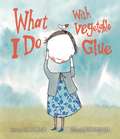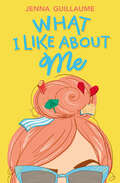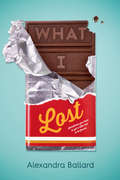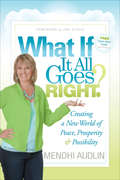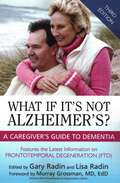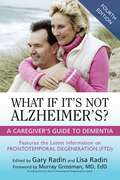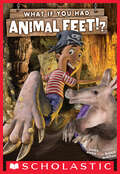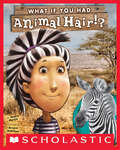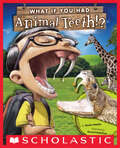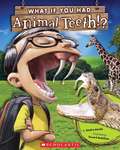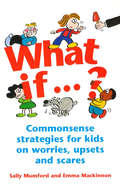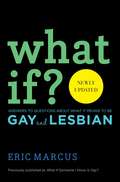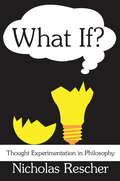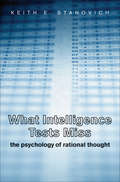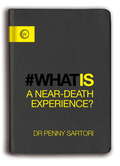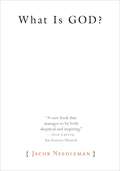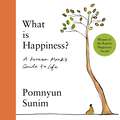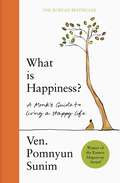- Table View
- List View
What Happens to a Hamburger? (Let's-Read-and-Find-Out Science 2)
by Paul ShowersRead and find out about your digestive system in this colorfully illustrated nonfiction picture book.What happens to food when you eat it? Read and find out about your digestive system and how it turns food into energy your body can use.This is a clear and appealing science book for early elementary age kids, both at home and in the classroom. It's a Level 2 Let's-Read-and-Find-Out, which means the book explores more challenging concepts for children in the primary grades. The 100+ titles in this leading nonfiction series are:hands-on and visualacclaimed and trustedgreat for classroomsTop 10 reasons to love LRFOs:Entertain and educate at the same timeHave appealing, child-centered topicsDevelopmentally appropriate for emerging readersFocused; answering questions instead of using survey approachEmploy engaging picture book quality illustrationsUse simple charts and graphics to improve visual literacy skillsFeature hands-on activities to engage young scientistsMeet national science education standardsWritten/illustrated by award-winning authors/illustrators & vetted by an expert in the fieldOver 130 titles in print, meeting a wide range of kids' scientific interestsBooks in this series support the Common Core Learning Standards, Next Generation Science Standards, and the Science, Technology, Engineering, and Math (STEM) standards. Let's-Read-and-Find-Out is the winner of the American Association for the Advancement of Science/Subaru Science Books & Films Prize for Outstanding Science Series.
What Happy People Know: How the New Science of Happiness Can Change Your Life for the Better
by Dan Baker Cameron StauthDan Baker, director of the Life Enhancement Program at Canyon Ranch, has devoted his life to teaching people how to be happy. And apparently, most of us could use a little tutoring. Research has shown that the root of unhappiness--fear--lies in the oldest, reptilian part of our brains, and negative reactions are often dictated by primal instincts. We're literally "hardwired for hard times." In What Happy People Know, Dr. Baker uses evidence from the new science of happiness to show us how we can overcome this genetic predisposition toward negative reactions and lead a truly rich, happy, and healthy life.
What Happy Teachers Do: The Three-Step Self-Care System to Support You Inside and Outside the Classroom
by Michelle AutonDiscover the simple three-part self-care system that will help you stay calm in class, enjoy a good work–life balance, and keep doing the job you love.It&’s a cliché but it&’s true: teaching is the best job in the world. So why are more teachers leaving the profession than ever before? Thanks to staff shortages, accountability pressures, and heavy workloads, teachers are burning out fast. This raises the question: How do you stay happy and keep teaching?Michelle Auton has the answer. Drawing on both her own 20+ years in the profession and the experiences of her many teacher friends, Michelle has developed a three-part system to help you not just survive, but thrive in teaching.In What Happy Teachers Do, she takes you through these three principles:1. Self-care: You&’ll learn how to deal with the unique highs and lows of the teaching year and practice good self-care every day.2. Mindfulness: Michelle explains the neuroscience and benefits of mindfulness, and details short mindful practices that can help you in times of stress, overwhelm, exhaustion, or judgment.3. Tapping: Tapping is an alternative treatment for physical pain and emotional distress, and can help to restore balance to your body's energy. Use these tapping—aka Emotional Freedom Techniques (EFT)—scripts in both your personal and teaching life, such as when you&’re having difficulty sleeping, preparing for a lesson observation, or worried about an awkward conversation with a parent.This book will help all teachers, whether you&’re in your first or thirty-first year of teaching, to reduce stress, prioritize self-care, and feel empowered. This is what happy teachers do.
What Happy Women Know: How New Findings in Positive Psychology Can Change Women's Lives for the Better
by Dan Baker Ina Yalof Cathy GreenbergThe director of Canyon Ranch's award-winning Life Enhancement Program draws on the latest discoveries in psychology and gender-specific medicine to help all women enjoy richer, healthier, more fulfilling lives.In this innovative book about what brings women happiness, Dr. Dan Baker focuses on the five traps that can compromise happiness and leave women yearning for a better life.Unlike clinical psychology, which focuses on trying to fix what's wrong with an individual, positive psychology builds on a person's natural strengths. The root of most unhappiness, fear, finds a special expression in women, who too often succumb to the happiness traps of perfectionism, wanton wanting, people pleasing, seeking revenge, thinking I'm nothing without X, and overinvesting in their careers.In What Happy Women Know, Dr. Baker synthesizes a wide range of current research on how women uniquely respond to life's slings and arrows and how they can best bounce back from them. The book offers women a compelling set of tools that will help them accept the past and actively move toward a happier future of their own design.
What He Can Expect When She's Not Expecting: How to Support Your Wife, Save Your Marriage, and Conquer Infertility!
by Gregory Rosen Marc SedakaMarc Sedaka stood by while he and his wife endured endless rounds of drug therapies, sixteen artificial inseminations, ten in-vitro fertilizations, three miscarriages, and, finally, a gestational surrogate ("womb for rent") who carried their twin girls to term. He was as supportive and loving as he could be, but he really wished he'd had a book like What He Can Expect When She's Not Expecting during the process. Most books about dealing with infertility are geared toward women, leaving the man to his own devices when it comes to comfort and encouragement (never a good idea). With the help of his own infertility doctor, Sedaka provides straightforward guy-friendly advice on situations such as: What questions you should ask at the consultations. How to help rather than annoy. What kinds of tests you and your wife should expect. How to console a wife who appears inconsolable. How to enjoy procreation sex. Sedaka's accessible, empathetic voice, combined with the fact that he experienced everything he writes about, makes this a must-have book for any infertile couple.
What Her Body Thought: A Journey Into the Shadows
by Susan GriffinIn this boldly intimate and intelligent blend of personal memoir, social history, and cultural criticism, Susan Griffin profoundly illuminates our understanding of illness. She explores its physical, emotional, spiritual, and social aspects, revealing how it magnifies our yearning for connection and reconciliation.Griffin begins with a gripping account of her own harrowing experiences with Chronic Fatigue and Immune Dysfunction Syndrome (CFIDS), a potentially life-threatening illness that has been misconstrued and marginalized through the label "psychosomatic." Faced with terrifying bouts of fatigue, pain, and diminished thinking, the shame of illness, and the difficulty of being told you are "not really ill," she was driven to understand how early childhood loss made her susceptible to disease.Alongside her own story, Griffin weaves in her fascinating interpretation of the story of Marie du Plessis, popularized as the fictional Camille, an eighteenth-century courtesan whose young life was taken by tuberculosis. In the old story, Griffin finds contemporary themes of "money, bills, creditors, class, social standing, who is acceptable and who not, who is to be protected and who abandoned." In our current economy, she sees "how to be sick can impoverish, how poverty increases the misery of sickness, and how the implicit violence of this process wounds the soul as well as the body."Griffin insists that we must tell our stories to maintain our own integrity and authority, so that the sources of suffering become visible and validated. She writes passionately of a society where we are all cared for through "the rootedness of our connections. How the wound of being allowed to suffer points to a need to meet at the deepest level, to make an exchange at the nadir of life and death, the giving and taking which will weave a more spacious fabric of existence, communitas, community." Her views of the larger problems of illness and society are deeply illuminating.
What I Do with Vegetable Glue
by Elena Odriozola Susan Chandler"When my right arm fell off, I knew what to do. I stuck it back on, with vegetable glue." This is a quirky story about a little girl who refuses to eat her vegetables. Suddenly things start falling off her body! Her right arm, her nose, and even her head roll away and she must use vegetable glue to stick them back on. Whenever she coughs, something is bound to go flying from her face-poor kid. Granny comes to save the day, though, with a bag of wonderful produce, and the little girl digs in as she realizes that eating cake for every meal might not be the healthiest of choices. What I Do with Vegetable Glue offers a silly story with a very important lesson for young children to inspire good eating habits-and a belly laugh or two.
What I Like About Me
by Jenna GuillaumePlus-sized sixteen-year-old Maisie Martin never thought she had the figure to compete in a beauty pageant, but this vacation is about to change everything.Maisie has spent most of her life hiding her body from everyone: her gorgeous best friend, her pageant-winning sister, and definitely her longtime crush. Never one to jump in the water, Maisie is planning on taking it easy while her friends chill at the beach.But then her BFF starts flirting with the boy she's always loved, her older sister comes home and steals the spotlight, and Maisie has found herself pushed aside like usual. Except now, she's had enough. After forging new friendships, Maisie takes the deep dive and enters the local Miss Teen Queen. Now, with all eyes on her, can Maisie prove she has a place in the spotlight?This contemporary young adult novel is as relatable as it is charming and Maisie's realistic journey towards confidence and self-love will draw readers in as she learns how to celebrate all of herself.
What I Lost
by Alexandra BallardWhat sixteen-year-old Elizabeth has lost so far: forty pounds, four jean sizes, a boyfriend, and her peace of mind. As a result, she’s finally a size zero. She’s also the newest resident at Wallingfield, a treatment center for girls like her—girls with eating disorders. Elizabeth is determined to endure the program so she can go back home, where she plans to start restricting her food intake again.She’s pretty sure her mom, who has her own size-zero obsession, needs treatment as much as she does. Maybe even more. Then Elizabeth begins receiving mysterious packages. Are they from her ex-boyfriend, a secret admirer, or someone playing a cruel trick? This eloquent debut novel rings with authenticity as it follows Elizabeth’s journey to taking an active role in her recovery, hoping to get back all that she lost.
What If It All Goes Right?: Creating a New World of Peace, Prosperity & Possibility
by Mendhi AudlinWhat if you could...Achieve greater financial success despite the “reality” of a struggling economy? Improve your physical health and well-being despite the “reality” of a medical diagnosis? Manifest your ideal romantic partner despite the “reality” of prior relationship disappointments? Fill your life with peace and beauty, despite headlines of violence and environmental degradation? Impact the world in a way that fulfills your purpose and passion, even after you’ve established a comfortable level of success in your life? What If It All Goes Right? reveals the secret to turning possibilities like these into a tangible reality. With more than ten years of real world application in colleges, businesses, churches, and beyond, world-renowned spiritual advisor Mindy Audlin shares the life-changing strategy that will elevate your mindset and put you on course for a brighter tomorrow, regardless of your current circumstances. You'll master the essential skills for thriving in today's rapidly changing society: the imagination to quickly identify innovative solutions for unprecedented challenges, and the wisdom to bring these ideas to fruition through "inspired action." When you are ready to get "unstuck," stop spinning your wheels and step off the treadmill of counterproductive actions, What If It All Goes Right? shows you the way. Discover step by step how to bring peace, prosperity and possibility into every area of your life... one thought at a time! What if this is the answer you’ve been waiting for?
What If It's Not Alzheimer's?
by Gary Radin Lisa Radin Murray GrossmanAlthough the public most often associates dementia with Alzheimer's disease, the medical profession now distinguishes various types of "other" dementias. This book is the first and only comprehensive guide dealing with frontotemporal degeneration (FTD), one of the largest groups of non-Alzheimer's dementias. The contributors are either specialists in their fields or have exceptional hands-on experience with FTD sufferers.Beginning with a focus on the medical facts, the first part defines and explores FTD as an illness distinct from Alzheimer's disease. Also considered are clinical and medical care issues and practices, as well as such topics as finding a medical team and rehabilitation interventions. The next section on managing care examines the daily care routine including exercise, socialization, adapting the home environment, and behavioral issues. In the following section on caregiver resources, the contributors identify professional and government assistance programs along with private resources and legal options. The final section focuses on the caregiver, in particular the need for respite and the challenge of managing emotions.This new, completely revised edition follows recent worldwide collaboration in research and provides the most current medical information available, a better understanding of the different classifications of FTD, and more clarity regarding the role of genetics. The wealth of information offered in these pages will help both healthcare professionals and caregivers of someone suffering from frontotemporal degeneration.
What If It's Not Alzheimer's?: A Caregiver's Guide to Dementia
by Gary Radin Lisa RadinAlthough the public most often associates dementia with Alzheimer&’s disease, the medical profession continues to advance distinctions of various types of &“other&” dementias. What If It&’s Not Alzheimer&’s? is the first and remains the only comprehensive guide dealing with frontotemporal degeneration (FTD), the most common form of dementia for people under 60 years of age. The contributors are either specialists in their fields or have exceptional hands-on experience with FTD sufferers. Beginning with a focus on the medical facts, the first part defines and explores FTD as an illness distinct from Alzheimer's disease. Also considered are clinical and medical care issues and practices, as well as such topics as finding a medical team, palliative approaches to managing care and rehabilitation interventions. The next section on managing care examines the daily care routine including exercise, socialization, adapting the home environment, and behavioral issues along with end-of-life concerns. In the following section on caregiver resources, the contributors identify professional and government assistance programs along with private and community resources and legal options. The final section focuses on the caregiver, in particular the need for respite, holistic health practices and the challenge of managing emotions. This new, completely revised edition continues to follow worldwide collaboration in research and provides the most current medical information available including understanding of the different classifications of FTD, and more clarity regarding the role of genetics. Additionally, essays written by people living with the disease provide moving, first-hand experiences. The wealth of information offered in these pages will help both healthcare professionals and caregivers of someone suffering from frontotemporal degeneration.
What If You Had Animal Feet? (What If You Had... ?)
by Sandra MarkleIf you could have any animal's feet, whose would you choose?WHAT IF YOU HAD ANIMAL FEET? is the next book in the successful WHAT IF series by Sandra Markle, illustrated by Howard McWilliam, following the very popular WHAT IF YOU HAD ANIMAL TEETH? and WHAT YOU IF HAD ANIMAL HAIR? This latest edition will teach kids about the amazing variety of feet in the animal kingdom and their specialty functions! From cheetahs' fast feet to mountain goats' nimble climbing hooves, to flies' sticky feet! Each animal profile will include a photo as well as illustrations of kids with animal feet that are sure to make kids laugh!
What If You Had Animal Hair? (What If You Had... ?)
by Sandra MarkleIf you could have any animal's hair, whose would you choose?If you had a polar bear's double coat, you would never have to wear a hat when playing in the snow. If you had reindeer hair, it could help you stay afloat in water. And if you had a porcupine's hair, no bully would ever bother you again! WHAT IF YOU HAD ANIMAL HAIR? is a follow-up to the adorable WHAT IF YOU HAD ANIMAL TEETH? Each spread will feature a photographic image of the animal and its hair on the left and an illustration of a child with that animal's hair on the right. As in ANIMAL TEETH, the illustrations will be humorous and will accompany informative text.
What If You Had Animal Teeth? (What If You Had... ?)
by Sandra MarkleIf you could have any animal's front teeth, whose would you choose?What If You Had Animal Teeth!? takes children on a fun, informative, and imaginative journey as they explore what it would be like if their own front teeth were replaced by those of a different animal. Featuring a dozen animals (beaver, great white shark, narwhal, elephant, rattlesnake, naked mole rat, hippopotamus, crocodile, and more), this book explores how different teeth are especially adapted for an animal's survival. At the end of the book, children will discover why their own teeth are just right for them. And they'll also get a friendly reminder to take good care of their teeth, because they're the only teeth they'll ever have. Each spread features a photograph of the animal using its specialized teeth on the left and a humorous illustrated image of a child using that animal's teeth on the right.
What If You Had Animal Teeth?!
by Sandra Markle Howard McwilliamRead about all your favourite animal friends! What If You Had Animal Teeth takes children on a fun, informative, and imaginative journey as they explore what it would be like if their own front teeth were replaced by those of a different animal. Featuring a dozen animals (beaver, great white shark, narwhal, elephant, rattlesnake, naked mole rat, hippopotamus, crocodile, and more), this book explores how different teeth are especially adapted for an animal's survival. At the end of the book, children will discover why their own teeth are just right for them. And they'll also get a friendly reminder to take good care of their teeth, because they're the only teeth they'll ever have. Each spread features a photograph of the animal using its specialized teeth on the left and a humorous illustrated image of a child using that animal's teeth on the right.
What If...?: Commonsense strategies for kids on worries, upsets and scares
by Mumford , Sally & Mackinnon , Emma Sally MumfordWhat if ......Your front tooth is knocked out?...You are staying at a friend's house and by mistake you break something?...You come home from school and you smell gas?...Your hamster has escaped?...You are bullied at school?...There is a strange man lurking by the playground?Today's world is perceived to be a much more dangerous place than it was twenty or thirty years' ago. Whether it is or not, events can happen in everyday life which can worry, scare or upset a child. What if... aims to provide children with basic, practical, commonsense strategies to deal with life - at school, at home, at a friend's house and out & about.Containing up to 100 different scenarios, What if... is designed to appeal to children as they learn to deal with life independently and is an essential reference for all parents and teachers who want to bring up confident, happy children.
What If?: Answers to Questions About What it Means to Be Gay and Lesbian
by Eric Marcusif you think your friend is a lesbian, can you ask her? how do people become gay? is it a sin? is it a choice? No question goes unanswered in this important book about being gay. All the basics -- and not-so-basics -- are covered in more than one hundred questions asked by real teens just like you. So the answers contain all the info you want to know. And just in case you feel like sharing, there's a new "parents only" chapter to clue them in too. Expert Eric Marcus has fully updated and revised this essential guide for today's readers. He candidly and clearly pushes aside the myths and misinformation about being gay and lesbian, answering all the questions that are on your mind.
What If?: Answers to Questions About What it Means to Be Gay and Lesbian
by Eric Marcusif you think your friend is a lesbian, can you ask her? how do people become gay? is it a sin? is it a choice? No question goes unanswered in this important book about being gay. All the basics -- and not-so-basics -- are covered in more than one hundred questions asked by real teens just like you. So the answers contain all the info you want to know. And just in case you feel like sharing, there's a new "parents only" chapter to clue them in too. Expert Eric Marcus has fully updated and revised this essential guide for today's readers. He candidly and clearly pushes aside the myths and misinformation about being gay and lesbian, answering all the questions that are on your mind.
What If?: Thought Experimentation in Philosophy
by Nicholas RescherThought experimentation has been a staple of philosophical methodology since classical antiquity, when Xenophanes of Colophon speculated that if horses had gods, they would be equine in form. Nicholas Rescher's What If? undertakes a systematic survey of the role and utility of thought experiments in philosophy. After surveying the historical issues, Rescher examines the principles involved, and explains the conditions under which thought experimentation can validly yield instructive results in philosophy. The reader gains understanding of the differences between scientific and philosophical experiments.What If? begins by examining the nature of thought experiments. It presents an overview of how thought experiments have figured in natural science and in historical studies, before moving on to examine how they function as an instrument of philosophical inquiry. After examining thought experiments from the pre-Socratics to the present day, Rescher turns from history to analysis, and examines the modes of reasoning involved in the use of speculative hypotheses in philosophical problem solving. He shows the limitations of speculative ontology, showing that thought experimentation can lead readily to paradox in a way that increasingly diminishes its usefulness. The book concludes by arguing and illustrating how and when it becomes pointless to push speculation, or thought experimentation beyond the limits of intelligibility and cogent sense.Among the principal features of Rescher's book is its elaborate analysis of the appropriate conditions for philosophical thought experimentation. Its cardinal thesis is that there indeed are limits to the appropriateness of this important methodological resource and that transgressing these limits destroys the prospect of drawing any valid lessons for the philosophical enterprise. What If? will be of interest to philosophers, students of philosophy, and theorists of logic and reasoning.
What Intelligence Tests Miss
by Keith E. StanovichCritics of intelligence tests--writers such as Robert Sternberg, Howard Gardner, and Daniel Goleman--have argued in recent years that these tests neglect important qualities such as emotion, empathy, and interpersonal skills. However, such critiques imply that though intelligence tests may miss certain key noncognitive areas, they encompass most of what is important in the cognitive domain. In this book, Keith E. Stanovich challenges this widely held assumption. Stanovich shows that IQ tests (or their proxies, such as the SAT) are radically incomplete as measures of cognitive functioning. They fail to assess traits that most people associate with "good thinking," skills such as judgment and decision making. Such cognitive skills are crucial to real-world behavior, affecting the way we plan, evaluate critical evidence, judge risks and probabilities, and make effective decisions. IQ tests fail to assess these skills of rational thought, even though they are measurable cognitive processes. Rational thought is just as important as intelligence, Stanovich argues, and it should be valued as highly as the abilities currently measured on intelligence tests.
What Is A Near Death Experience?
by Dr Penny SartoriDeath is the only certainty in life yet many people shy away from thinking about it until something drastic happens such as the diagnosis of a life-threatening illness, or the sudden death of a loved one, which can throw us into turmoil. Yet, paradoxically, contemplating death and the frequently-experienced phenomenon of near-death experiences (NDEs) - which are so little recognised and supported within the traditional medical environment - can really help alter our relationship with death and release us from the fear that often surrounds it.After an insightful introduction about why the subject of NDEs is so worth exploring, each chapter in this book addresses a key question: What are the Characteristics of an NDE, and are there different types? Are all NDE experiences pleasant, or can some be distressing? Who has NDEs and under what circumstances do they occur? How do they affect the people who have them, and how can this change their lives? How can NDEs be scientifically explained - aren't they just hallucinations? What can we learn from NDEs, and can they change our attitude to life and death? Can a greater understanding of NDEs lead to an evolution in our consciousness and an enhanced sense of spirituality?As such, this book really brings readers on an exploratory journey through the world of NDEs, challenging preconceptions about what they are and the impact they can have, encouraging us to accept and feel empowered by death, rather than living in fear of it, and giving us useful insights about life along the way.From the Trade Paperback edition.
What Is God?
by Jacob NeedlemanIn his most deeply personal work, religious scholar Needleman cuts a clear path through today's clamorous debates over the existence of God, illuminating an entirely new way of approaching the question of how to understand a higher power. I n this new book, philosopher Jacob Needleman- whose voice and ideas have done so much to open the West to esoteric and Eastern religious ideas in the twentieth and twenty-first centuries-intimately considers humanity's most vital question: What is God? Needleman begins by taking us more than a half century into the past, to his own experience as a brilliant, promising, Ivyeducated student of philosophy-atheistic, existential, and unwilling to blindly accept childish religiosity. But an unsettling meeting with the venerated Zen teacher D. T. Suzuki, combined with the sudden need to accept a dreary position teaching the philosophy of religion, forced the young academician to look more closely at the religious ideas he had once thought dead. Within traditional religious texts the scholar discovered a core of esoteric and philosophical ideas, more mature and challenging than anything he had ever associated with Judaism, Christianity, and the religions of the East. At the same time, Needleman came to realize-as he shares with the reader-that ideas and words are not enough. Ideas and words, no matter how profound, cannot prevent hatred, arrogance, and ultimate despair, and cannot prevent our individual lives from descending into violence and illusion. And with this insight, Needleman begins to open the reader to a new kind of understanding: The inner realization that in order to lead the lives we were intended for, the very nature of human experience must change, including the very structure of our perception and indeed the very structure of our minds. In What Is God?, Needleman draws us closer to the meaning and nature of this needed change-and shows how our present confusion about the purpose of religion and the concept of God reflects a widespread psychological starvation for this specific quality of thought and experience. In rich and varied detail, the book describes this inner experience-and how almost all of us, atheists and "believers" alike, actually have been visited by it, but without understanding what it means and why the intentional cultivation of this quality of experience is necessary for the fullness of our existence.
What Is Happiness: A Korean Monk's Guide to Life
by Pomnyun Sunim'When I ask people, "Are you happy?" in my talks, very few people say yes.'There are many things that seem to prevent us from being happy in our lives. Usually, things don't turn out the way we want them to. It could be unfulfilled goals, bad habits, a society that's built to benefit only those at the very top, or the loops of self-deprecation that many of us find ourselves falling into. But we can take control of our happiness, whatever life throws at us. We all have the right, and the ability, to be happy regardless of our situation.With his simple yet profound teachings, Buddhist monk Pomnyun Sunim shows us how to combat day-to-day anxiety, insecurity, anger, and discouragement. He explains why humans are prone to self-destruction, and redirects our focus to finding happiness.This book has touched countless lives and uplifted spirits in Korea, and it's time for the rest of the world to experience and understand exactly what is happiness.
What Is Happiness: A Monk's Guide to a Happy Life
by Pomnyun Sunim'When I ask people, "Are you happy?" in my talks, very few people say yes.'There are many things that seem to prevent us from being happy in our lives. Usually, things don't turn out the way we want them to. It could be unfulfilled goals, bad habits, a society that's built to benefit only those at the very top, or the loops of self-deprecation that many of us find ourselves falling into. But we can take control of our happiness, whatever life throws at us. We all have the right, and the ability, to be happy regardless of our situation.With his simple yet profound teachings, Buddhist monk Pomnyun Sunim shows us how to combat day-to-day anxiety, insecurity, anger, and discouragement. He explains why humans are prone to self-destruction, and redirects our focus to finding happiness.This book has touched countless lives and uplifted spirits in Korea, and it's time for the rest of the world to experience and understand exactly what is happiness.

